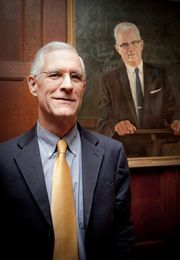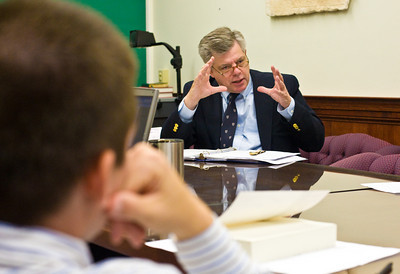Westminster Difference: Apologetics
August 31, 2010

"...but in your hearts honor Christ the Lord as holy, always being prepared to make a defense to anyone who asks you for a reason for the hope that is in you; yet do it with gentleness and respect."
1 Peter 3:15 (ESV)
Apologetics is a theological discipline that seeks to defend and commend the Christian faith. The apologetic tradition of Westminster attempts to apply Reformed theology to the challenges that confront Christianity and the church. Apologetics is an indispensable preparation for gospel ministry and for evangelism.
"Our apologetic defense is not our shield. We do not rely on what we say or on out methodology or our gifts and skills when we defend the Christian faith. That would be a defense that is centered on us. But our defense is not man-centered, it is God-centered from beginning to end. Our defense of the faith, therefore, is through faith. That is, we trust in God as we defend, not in ourselves. Our trust is in him and his power, both to guard us and to change hearts and minds..." (p.5).
Rev. Dr. K. Scott Oliphint and Rev. Dr. Lane G. Tipton, Revelation and Reason (p. 5)
An Excerpt from the First chapter of Christian Apologetics by Cornelius Van Til:
It is frequently said that apologetics deals with theism, while evidences deals with Christianity. For this reason, it is said, apologetics deals with philosophy while evidences deals with facts.
Now there is, to be sure a certain amount of truth in this way of putting the matter. Apologetics does deal with theism more than it deals with Christianity, and evidences does deal with Christianity more than it deals with theism. For that reason, too, apologetics deals mostly with philosophy and evidences deals mostly with facts. But the whole matter is a question of emphasis.
That the whole question can be no more than one of emphasis and never one of separation is due to the fact that Christian theism is a unit. Christianity and theism are implied in one another. If we ask, e.g., why Christ came into the world, the answer is that he came to save his people from their sins, but what is sin? It is "Any want of conformity unto, or transgression of, the law of God." And who or what is God?
True, we have here given the orthodox doctrine of the work of Christ, and the orthodox definition of sin. But wecould just as well give any other definition of the work of Christ and we should find that it always involves a certain concept of God. If we say that Christ came to set us a fine example of morality and no more, then we have redefined sin to mean some weakness inherent in human nature and therewith we have redefined God to be something less than that absolute and holy being which orthodox theology conceives him to be. Christianity can never be separated from some theory about the existence and the nature of God. The result is that Christian theism must be thought of as a unit.
For more, see COMPLETE Westminster Admissions Booklet
To learn how to become a student at Westminster, click here.









